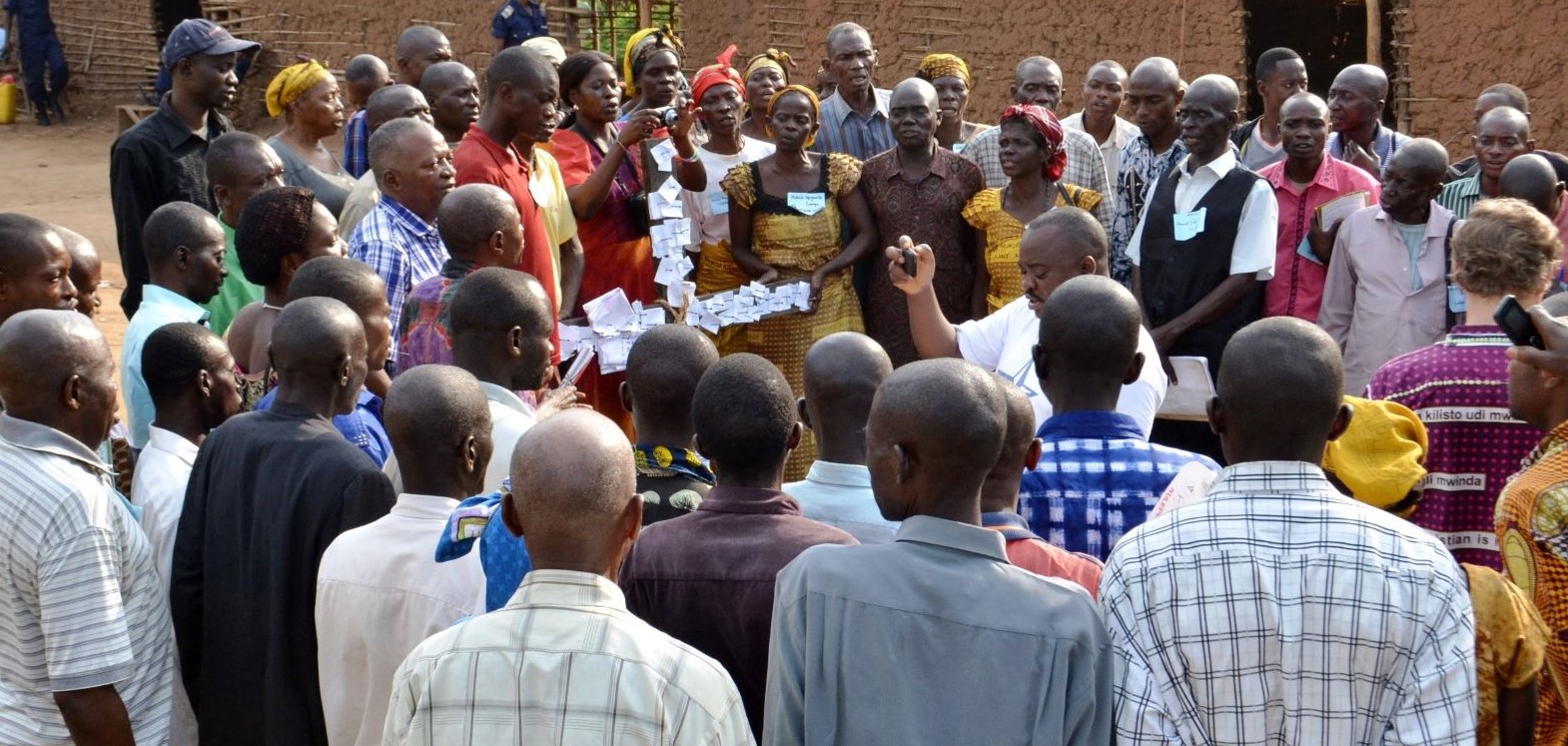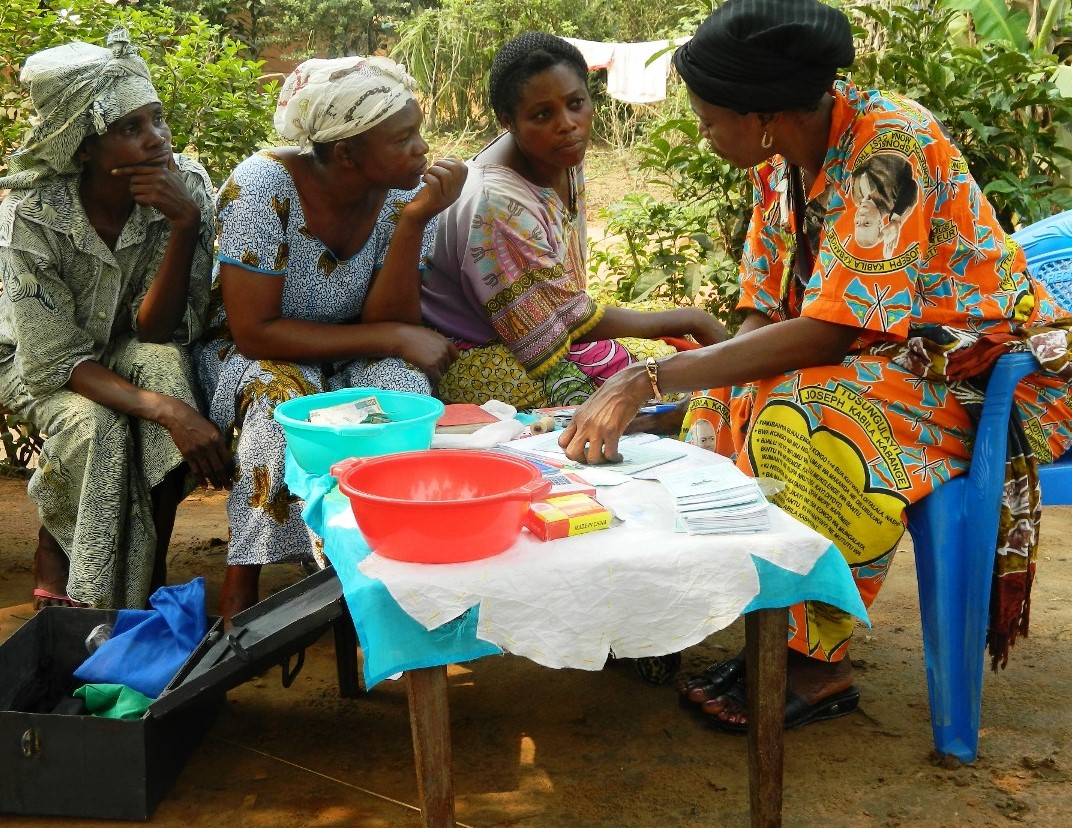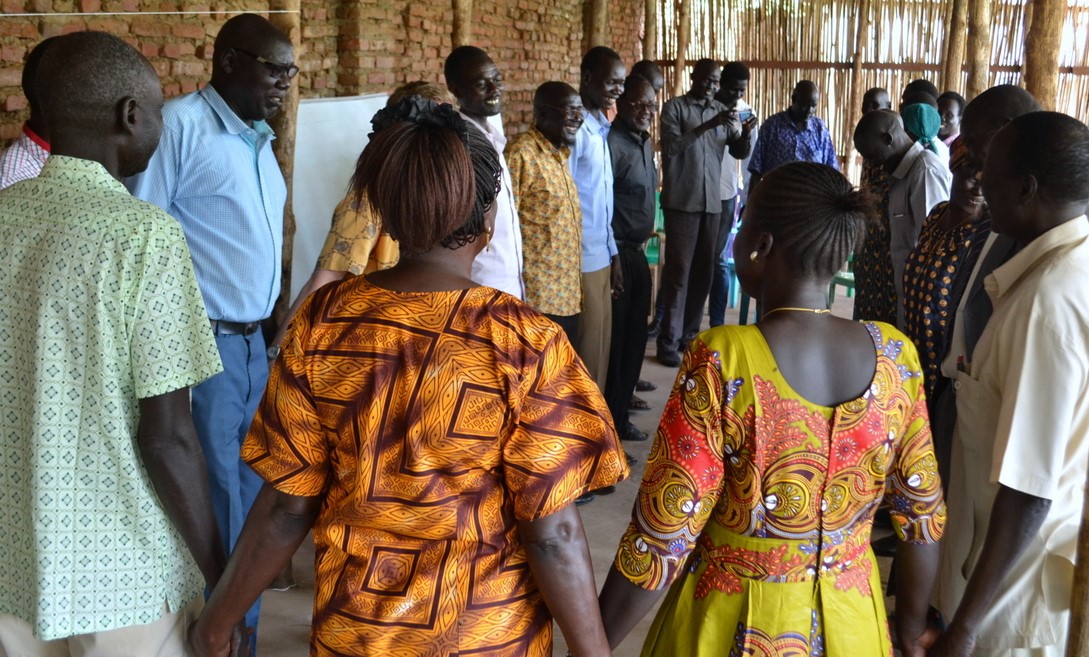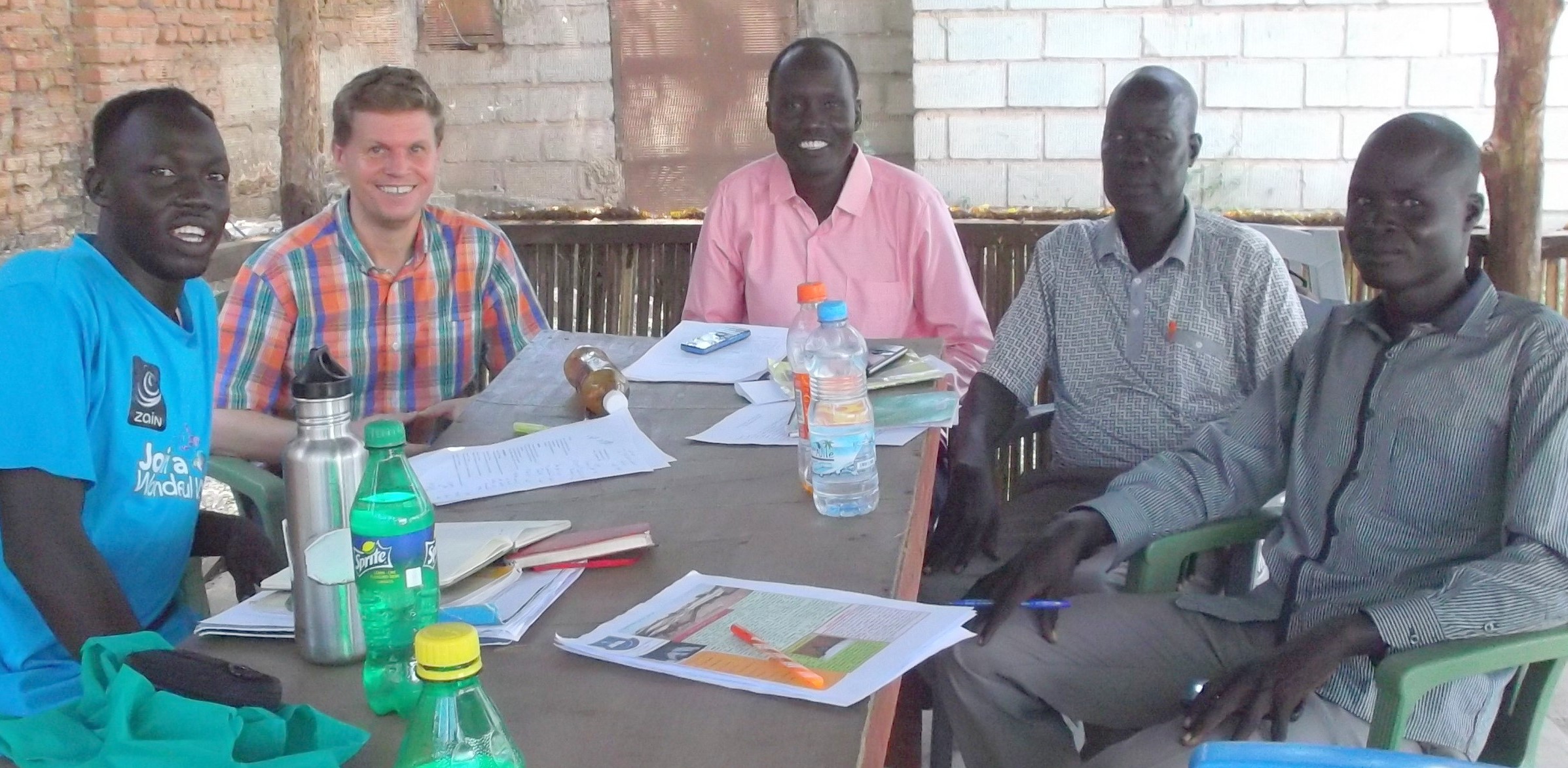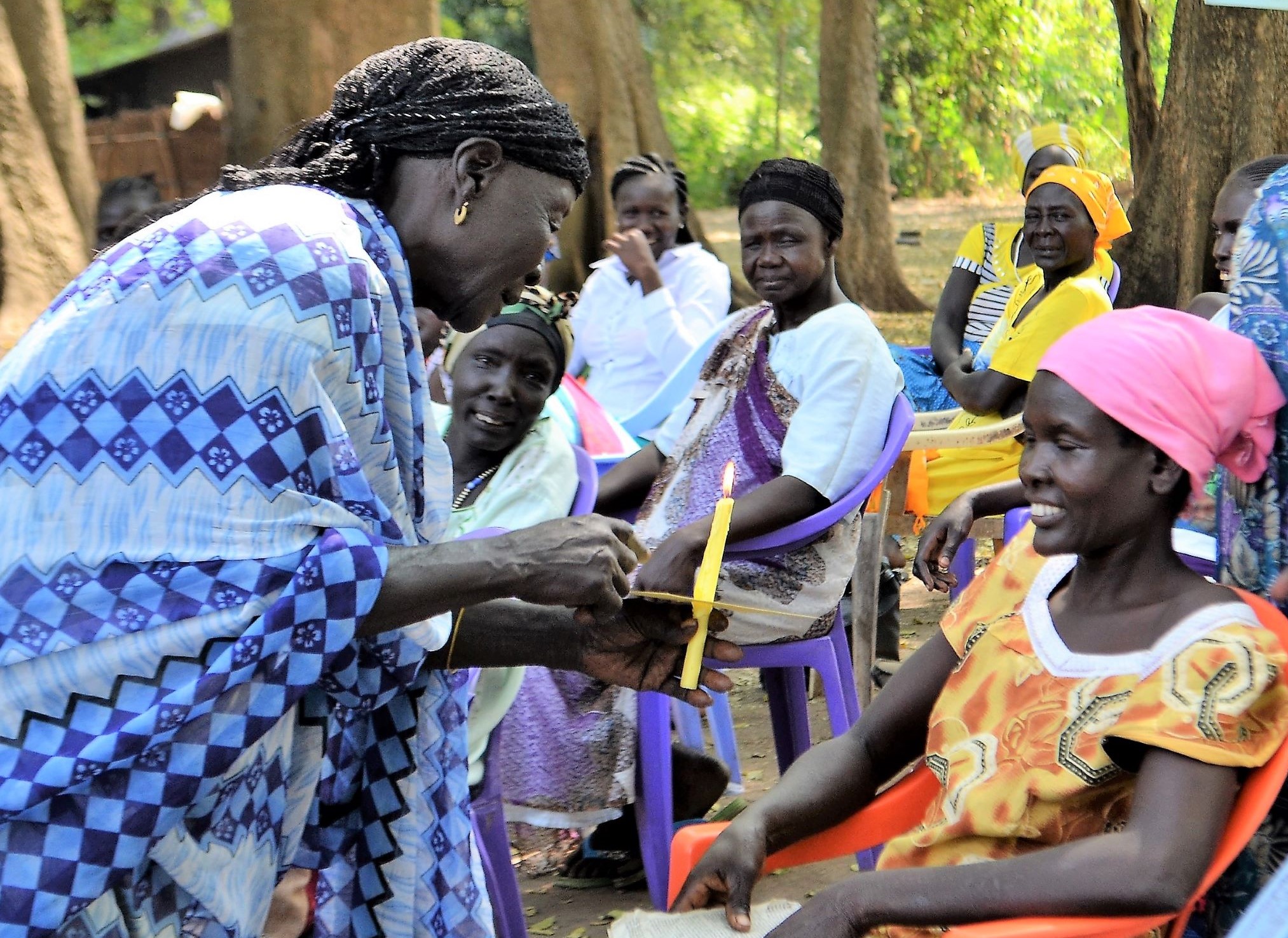| ||
| ||
Since Jesus calls Christians to make disciples of all nations, in this blog we'll consider how we might better share the gospel to the world around us.
Saturday, February 29, 2020
A Letter from Bob and Kristi Rice, serving in South Sudan
Today in the Mission Yearbook - The power of sharing our stories
Words tell of hope in South Sudan — and beyond
February 29, 2020

Rachel Obal recalled her time as a young girl playing ball in the schoolyard — an opportunity many girls didn’t have. Today, through her work and the work of mission co-workers like Nancy Smith-Mather, hope in a brighter future exists for girls in South Sudan. Courtesy of Nancy Smith-Mather
I sat next to Rachel Obal outside of her home in rural South Sudan, listening to the story of her uncle who, as a boy, was taken from his home by Arabs to be sold as a slave near Khartoum, Sudan. Obal’s words painted a vivid picture as she spoke of how her father followed his brother to rescue him and had to witness the small boy, with hands tied behind his back, paraded in front of crowds to be sold.
No one, though, would buy the boy, as he was too young. And so Obal’s father tried to negotiate for his release. That didn’t work out well. The men who took his brother would allow the young boy to go free only after Obal’s father worked for them for five years.
“So my father worked for them, and during that time he learned Arabic. After five years, he returned to Akobo, his home in southern Sudan, with his brother by his side,” Obal said.
American Presbyterian missionaries came to Akobo. Many of them, Obal said, had learned Arabic while in Khartoum. Obal’s father soon became the village’s translator, translating the Arabic the missionaries were able to speak into the Anyuak language of those in Akobo.
The missionaries, Obal said, would preach in the villages. Then they built a church, a clinic and a school. They would preach in the school, the clinic and the church about God’s love and salvation.
“Every morning, before opening the clinic, there was prayer. People heard about spiritual and physical healing,” she said.
When she was a child, her father made the radical decision to put Obal and her sisters in school.
Obal finished her elementary schooling in Akobo, then went to an intermediate school in Yei. It was like “heaven on earth,” she recalled, as she was able to commit to full-time studies.
Obal stayed in dormitories at the boarding school in Yei, where she not only studied hard, she played basketball and volleyball too.
When Obal’s father died while she was still young, the family was adopted by the church in Akobo, and Obal and her sisters were able to continue their education.
“When we had our three-month holiday from school, my sisters and I would come back to Akobo and work for the missionaries of the church who adopted us,” Obal said.
People in the community saw that the education of the Obal girls brought them money, and because of that parents started putting their girls in school.
In 1965, war broke out. The Arabs said the missionaries were helping the South Sudanese and so they were expelled, Obal said.
Obal’s sister joined the liberation movement. She remained in Akobo with their mother and raised money for the liberation army. Obal was arrested and jailed for her support of the liberation army.
“They told me if I continued to support the rebels, they would kill me too,” she remembered.
Obal, however, didn’t back down and told them, “If you kill me, it is my day to die.” She was eventually released.
Life remained hard for the Obal family for the next two decades, when finally, in the early 1980s, Obal’s family applied for resettlement in the United States. Home would now be Jacksonville, Florida.
Obal took a cue from her father and began volunteering as a translator at a refugee resettlement agency. She also put her own experiences to work, becoming a case manager helping to resettle refugees from around the world. Obal worked tirelessly, and when she needed more help, she would seek out more volunteers at area churches.
“I got so many volunteers involved, that I got an award from the White House, signed by President Obama,” Obal said. “People thought, ‘Who is this lady; who is doing all these things?’ But it was by the grace of God.”
I found myself realizing how important it is to share our stories with one another. To let each other’s stories break our hearts, quiet our spirits, cause contagious laughter, feel our connectedness and our distance, and make us care about each other’s struggles and aspirations.
Nancy Smith-Mather, Mission Co-Worker, Presbyterian Mission Agency
Let us join in prayer for:
PC(USA) Agencies’ Staff
Mason Todd, Office of the General Assembly
Julie Tonini, Presbyterian Publishing Corporation
Mason Todd, Office of the General Assembly
Julie Tonini, Presbyterian Publishing Corporation
Let us pray:
God of all peoples, we thank you for the richness of your world and the diversity of your people. Help us learn from each other and support each other as we all explore better ways to serve you and your communities. Amen.
Friday, February 28, 2020
Today in the Mission Yearbook - Liturgy helps cultivate gratitude
Thankful for what we have
February 28, 2020
 When I go to the gym and get on a treadmill, I sneak a look at the people around me. Who are they? How fast are they going? How steep an incline is their machine set at? Then I compare myself to one of them. Am I going faster? Is my incline steeper? Lately, it often seems that I’m much slower than my gym neighbors. They have better numbers showing on their machines.
When I go to the gym and get on a treadmill, I sneak a look at the people around me. Who are they? How fast are they going? How steep an incline is their machine set at? Then I compare myself to one of them. Am I going faster? Is my incline steeper? Lately, it often seems that I’m much slower than my gym neighbors. They have better numbers showing on their machines.
When I compare myself to the person beside me, the voices in my head start. One applauds me for simply showing up. Another is like a drill sergeant running alongside me yelling that I’m too slow and can go faster. Another is a soothing yoga instructor who reminds me to focus. I sneak a peek at my neighbor’s machine, and I bump up my speed and my incline to try to keep up.
When I do this, it seems the person beside me fiddles with her machine. Huffing and puffing I sneak another look at my neighbor, who seems to be always going faster. Eventually another voice in my head shouts, “She’s 20 years younger than you! Stop it!”
At the gym, I compare myself to the people who are younger, faster and stronger. This comparison and competition can lead me to push myself in ways that can improve my pace. But it can also lead to feelings of failure.
So often this happens in our small churches as well. We sit in meetings or at conferences and look at our neighbors with better numbers. They are bigger or younger or seem to be going farther in ministry or mission than our own. We compare ourselves to megachurches or new worshiping communities and fear for our decline.
It’s human nature to look at those who have more rather than those who have less. Like Eve surveying the fruit on the tree of knowledge of good and evil, many of us look at the latest and greatest churches and say, yes, we should have that, too.
This is a great time to cultivate gratitude, but our comparative — or even competitive — nature can have the opposite effect, keeping us mired in fear and failure. If we only focus on how much we lack, we miss the opportunity to be grateful for what we have. Competition can trample gratitude.
Chances are you know part of the Prayer of Great Thanksgiving, in the Communion liturgy, by heart. It goes like this:
The Lord be with you.
And also with you.
Lift up your hearts.
We lift them to the Lord.
Let us give thanks to the Lord our God.
It is right to give our thanks and praise.
And also with you.
Lift up your hearts.
We lift them to the Lord.
Let us give thanks to the Lord our God.
It is right to give our thanks and praise.
The liturgy helps us remember that we have much to be grateful for. It reminds us that church isn’t just about the number of people in the pews or the awesome programs or music offered. Church is about remembering what God has done in the past, being thankful for the gifts God offers in the present and praising God for being generous and faithful. So, as the body of Christ, let us not allow the fear of failure and decline to hold us back, but let us give thanks.
Sue Washburn, Pastor of Reunion Presbyterian Church in Mount Pleasant, Pennsylvania
Let us join in prayer for:
PC(USA) Agencies’ Staff
Paula Tibbs, Presbyterian Mission Agency
Kenneth Tichenor, Jr., Administrative Services Group (A Corp)
Paula Tibbs, Presbyterian Mission Agency
Kenneth Tichenor, Jr., Administrative Services Group (A Corp)
Let us pray:
Gracious and loving God, help us to open our hearts and minds, to be grateful for your many blessings and to continue to strive to be effective advocates of your teachings. And may we always be mindful of the needs of others. Amen.
Thursday, February 27, 2020
Today in the Mission Yearbook - It’s a beautiful day in the Presbyterian neighborhood
Tom Hanks’ portrayal of Fred Rogers is Hollywood’s most recent look at Presbyterian clergy
February 27, 2020
Though the Presbyterian Church (U.S.A.) is a relatively small denomination compared to Baptists or Methodists, Hollywood has paid plenty of attention to Presbyterian clergy.
- In 1955, crowds packed theaters to see “A Man Called Peter.” Richard Todd played the golden-tongued Peter Marshall, who served as U.S. Senate chaplain. It was a film that inspired many young people, including myself, to become a minister.
- In 1992, “A River Runs Through It” was released. The film is based on Norman Maclean’s autobiographical book in which his Presbyterian minister father loves to fly fish almost as much as he enjoys preaching.
- In the 1972 film adaptation of the Broadway musical “1776,” one of our spiritual forebears who gave his name to the street on which the PC(USA)’s Louisville headquarters sits, John Witherspoon, has a small role. He joins the Philadelphia gathering late as a delegate from New Jersey. When John Hancock learns he is a minister, Witherspoon is asked to be the chaplain of the Continental Congress.

Fred Rogers, played by Tom Hanks, welcomes Lloyd Vogel (Matthew Rhys) to the WQED studio in Pittsburgh in a scene from “A Beautiful Day in the Neighborhood.” (Photo courtesy of TriStar Pictures)
However, the most recent example, “A Beautiful Day in the Neighborhood,” takes little note that Fred Rogers was a Presbyterian minister. There is no mention of God or prayer until the last few minutes of the film.
Scriptwriters Noah Harpster and Micah Fitzerman-Blue, drawing on writer Tom Junod’s 1998 story for Esquire titled “Can You Say…Hero?,” are more interested in Rogers’ extraordinary kindness than in his religion. The result is not a biography of Fred Rogers — for that we already have last year’s delightful documentary “Won’t You Be My Neighbor?” The new film is the story of a relationship and the healing power of friendship, as well as a father-son story.
In New York City, Junod’s name is changed to Lloyd Vogel (played by Matthew Rhys). He has been told by his editor to write a brief profile (about 400 words) for a Hero issue of Esquire magazine.
It is not a good time for Vogel. He is coping with being a new father while at war with his own father (Chris Cooper). Vogel has never gotten over his anger at his father’s abandoning him and his sister when their mother was dying years ago. His bitterness infects his writing as well.
However, Rogers piques the interest of the jaded reporter, and so they have other encounters, mostly in New York. By this time Rogers had ceased production of the “Mister Rogers’ Neighborhood” series and moved on to other projects, some of which were aimed at adults, whose influence he knew could have a great effect upon children. During Fred and wife Joanne Rogers’ frequent visits to Manhattan, where they maintained an apartment for use during business trips, the reporter and the TV host meet several times. Vogel has been told that Fred Rogers is especially drawn to “broken people.”
Rogers at times telephones Vogel, concerned that the man is deeply troubled. In one dramatic encounter he asks if Vogel had a special friend as a child. After a moment or two, Vogel mentions there was a toy rabbit. Enter Fred’s puppets.
Bringing in Joanne Rogers (Maryann Plunkett) helps Lloyd (and us) see Fred not as a “living saint,” but as a man with his own problems that he too struggles with. Hanks, as everyone seems to agree, beautifully captures the essence of Fred Rogers, especially Rogers’ slow-paced, soft-voiced speech and intense concentration as he listens to people. Due credit also must be given to Rhys, who convincingly displays the anger and anguish of Junod. The man may be a famous writer for a top magazine, but Rogers discerns that at heart he is still the angry boy deeply hurt by, and thus resentful of, his father. When Rogers’ agape form of love, so beautifully described by the apostle Paul in 1 Corinthians 13, envelops him, he begins to change as he rediscovers the hurting child buried deeply in himself. A broken man learns that he does not have to stay broken.
Dr. Edward McNulty, Minister at Blue Ball Presbyterian Church in Ohio
Let us join in prayer for:
PC(USA) Agencies’ Staff
Mark Thomson, Presbyterian Mission Agency
Kathryn Threadgill, Presbyterian Mission Agency
Kathryn Threadgill, Presbyterian Mission Agency
Let us pray:
Good and gracious God, we thank you for Fred Rogers, whose life and story continue to inspire countless others to this day. Amen.
Wednesday, February 26, 2020
Today in the Mission Yearbook - Congregation fights hunger in greater St. Louis
Faith Des Peres sets an example as a Presbyterian Hunger Program Action Congregation
February 26, 2020

The members of Faith Des Peres Presbyterian Church in St. Louis have a passion for doing outreach related to the causes of hunger and homeless. (Contributed photo)
As a Hunger Action Congregation, Faith Des Peres Presbyterian Church is taking aim at food insecurity in greater St. Louis by providing food for schoolchildren and other vulnerable populations.
Volunteers from the church come together to assemble sacks of food that are distributed to students in the School District of University City who might have trouble getting meals outside of school hours.
“We know a lot of kids get (free) meals at school during the week, but they may not have access to that kind of food on the weekends,” said Erica Abbett, moderator of the Mission and Ministry Center at Faith Des Peres. “Our Buddy Packs include things like applesauce and fruit and small cans of vegetables and tuna fish — things that they can actually get a somewhat healthy meal out of.”
The packing takes place in the church’s fellowship hall, with children from the church sometimes working alongside adult volunteers, filling grocery sacks for students in need.
“Each month, we pack somewhere between 240 and 300 packs in that one monthly Sunday, right after church,” Abbett said. “And then every two weeks we deliver half of that supply to the school district, and then they use it to distribute it among their four elementary schools.”
Gary Spiller, executive director of student services and innovation for the school district, praised the program as a “critical connector” and something that contributes positively to the learning environment.
“The district puts student well-being at a premium,” he said. “Students are not ready to learn if they are hungry and do not have regular, healthy meals.”
Assembling Buddy Packs is just one of the activities that helped Faith Des Peres become certified recently as a Hunger Action Congregation (HAC).
Churches in the Hunger Action program are active in one or more of the following areas: hunger alleviation, development assistance, hunger education, lifestyle integrity, corporate and public policy witness, and worship.

The church held a “Freeze Out” to raise awareness about homelessness. People slept on the front lawn on a frigid night and then shared their experiences with the congregation. (Photo by Erica Abbett)
The HAC program, which currently includes 164 churches in 69 presbyteries, “lets the national church celebrate alongside individual congregations who demonstrate a commitment to hunger ministry, and it helps encourage local churches by sharing their stories in order to inspire and connect them to other Presbyterian congregations acting on hunger,” the Rev. Rebecca Barnes, coordinator of the Presbyterian Hunger Program, said in an email. “We hope that this program both enlivens local ministries and helps spread the idea that all congregations can do something to help end hunger — from feeding programs to advocating for just public policies.”
Faith Des Peres has a history of mission work that includes helping the hungry and raising awareness about the homeless. One such activity, the “Freeze Out,” involved participants sleeping in cardboard boxes on the church lawn and then sharing their experiences with the congregation. The church also created homeless kits containing razors, socks and snacks, among other items.
The church’s vision is “challenging the present to change the future to make Christ known,” Abbett said. Basically, “any mission and ministry program that we do is our enactment of making Christ known.”
In addition to helping schoolchildren, Faith Des Peres packs meals for homebound people who have serious conditions, such as HIV/AIDS and related illnesses.
The church also has a community garden that, among other things, provides fresh produce for a local pantry. The church also takes a food collection for the food pantry on the first Sunday of each month, or in conjunction with communion.
“What’s really kind of fun about this is that we involve the children in this ministry,” Abbett said. “They pull red wagons down the church aisle and collect the food that way.”
Intergenerational work teaches valuable lessons, said the Rev. Marilyn S. Gamm, Faith Des Peres’ transitional pastor.
“Our children are learning, from a young age, not only that others are going hungry but that there is something that they can do to help feed people, being Jesus’ hands and feet here in our community,” she said via email.
Darla Carter, Communications Associate, Presbyterian Mission Agency
Let us join in prayer for:
PC(USA) Agencies’ Staff
Erica Thomasson, Presbyterian Foundation
Edward Thompson, Board of Pensions
Edward Thompson, Board of Pensions
Let us pray:
Triune God, help us, rejoicing in your providential love, to exercise the same generosity with others that you share with us. Empower us to let go of the few loaves and fishes that we possess so that other hungry people can be fed, too. Then open our eyes to the miracles that follow. In Christ. Amen.
Tuesday, February 25, 2020
News from Presbyterian World Mission – February 2020
|
|
|
|
|
|
|
|
Subscribe to:
Comments (Atom)
Mission Yearbook: North Carolina church holds senior health event for members, community
Covenant Presbyterian Church , an African American congregation in Durham, North Carolina, is doing its part — and then some — to raise awar...

-
The theme for the final day of Presbyterian Youth Triennium was “Wake Up and Dream,” and the high-energy, thoughtful and feel-good worship...
-
Churches, Denominations and Religions: Find courage and creativity for the elevation of t... : Are you ...
-
“Lights! Camera! Sermon!” Those who gather for worship in PC(USA) faith communities aren’t likely to hear those words spoken from the pulpit...

